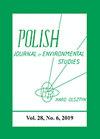Eco-Efficiency and Influence Factors of Main Ports in Yangtze River Delta under Carbon Peaking and Carbon Neutrality Target
IF 1.3
4区 环境科学与生态学
Q4 ENVIRONMENTAL SCIENCES
引用次数: 0
Abstract
Ports play an important role in transportation networks, but the ecological efficiency of many ports cannot reach an effective level. To improve the ecological efficiency of ports, we need to analyze the current ecological efficiency of ports and propose policy recommendations based on the results. In this paper, we first employed the super-efficiency SBM model to calculate the ecological efficiency of the four major ports in the Yangtze River Delta port group from 2011 to 2021. The results showed that the average comprehensive ecological efficiency of the four major ports was 0.647, which did not reach the effective level. The overall ecological efficiency curve was U-shaped. Then we used the Tobit model to analyze the key factors affecting the port’s ecological efficiency. We found that the economic development of port cities could promote the improvement of port ecological efficiency. The application level of emerging technologies also had a positive impact, but the impact was weak. However, expanding the scale of the port would reduce its ecological efficiency. At last, we provided some policy recommendations.碳峰值和碳中和目标下长江三角洲主要港口的生态效益及其影响因素
港口在交通网络中发挥着重要作用,但许多港口的生态效率无法达到有效水平。为了提高港口的生态效率,我们需要对港口的生态效率现状进行分析,并根据分析结果提出政策建议。本文首先采用超效率 SBM 模型计算了长三角港口群四大港口 2011-2021 年的生态效率。结果表明,四大港口的平均综合生态效率为 0.647,未达到有效水平。总体生态效率曲线呈 "U "型。随后,我们利用 Tobit 模型分析了影响港口生态效率的关键因素。我们发现,港口城市的经济发展可以促进港口生态效率的提高。新兴技术的应用水平也有积极影响,但影响较弱。然而,港口规模的扩大会降低其生态效率。最后,我们提出了一些政策建议。
本文章由计算机程序翻译,如有差异,请以英文原文为准。
求助全文
约1分钟内获得全文
求助全文
来源期刊

Polish Journal of Environmental Studies
环境科学-环境科学
CiteScore
3.10
自引率
11.10%
发文量
430
审稿时长
4 months
期刊介绍:
One of the most important challenges facing the contemporary scientific world are problems connected with environmental protection. Intensive development of industry and agriculture has led to a rise in living standards on one hand, but an increase in environmental degradation on the other. This degradation poses a direct threat to human health and life. Solving these ever-increasing problems which seriously endanger our civilization require the united efforts of scientists and field researchers of many branches.
The "Polish Journal of Environmental Studies" publishes original papers and critical reviews on the following subjects:
-Basic and applied environmental pollution research, including environmental engineering
-Pollution control of atmospheric, water (marine and fresh), soil and biological materials
-Determination of harmful substances, including their metabolic breakdown patterns
-Analytical methods for metabolic breakdown patterns or other chemical degradation patterns in the environment and in biological samples
-Development of new analytical methods, instruments and techniques for controlling pollutants
-Circulation of pollutants in the environment and their effect on living organisms
-Environmentally oriented catalysis
-Hazards to human health and safety
-Waste utilization and management
-Land reclamation
-Conference reports, scientific and technical reports and book reviews
 求助内容:
求助内容: 应助结果提醒方式:
应助结果提醒方式:


